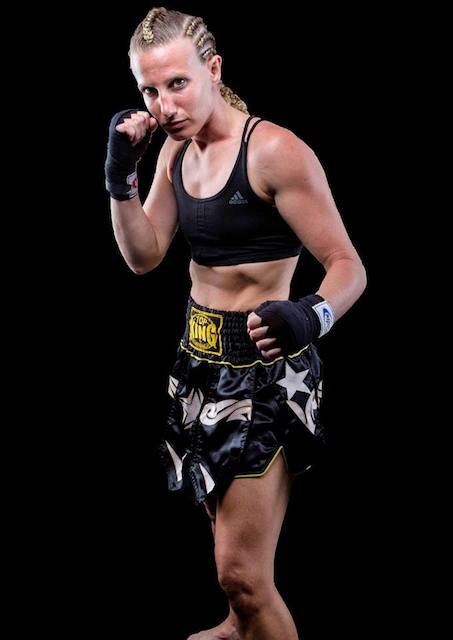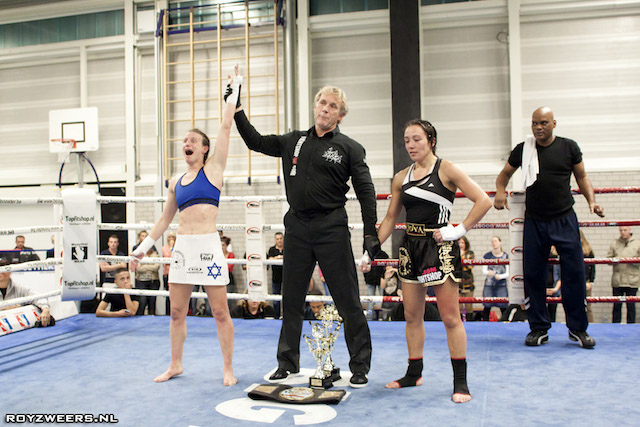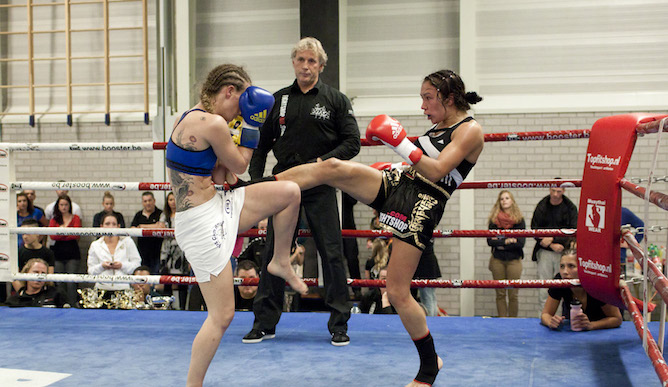Adi Rotem walks quickly, with purpose, as though worried about being late. She has just finished teaching a kickboxing class at the Gordon Pool compound on the Tel Aviv coast. Her long, curly blond hair is pulled into a ponytail, and she is wearing shorts and sneakers. The only evidence of the fact that it is winter is her long-sleeved league jacket, zipped up all the way.
Rotem, 34, who also teaches at CrossFit Tel Aviv, is not what one would expect a world-champion martial artist to look like. Indeed, when she was four, her mother signed her up for ballet lessons. But neither the pink tutu nor satin slippers could keep her attention from wandering to the room next door, where a bunch of boys were “going at each other” on mats.
Her mother succumbed to the headstrong child’s pestering to switch activities. And Rotem has been engaged in her passion for organized combat ever since kindergarten, when she began taking lessons at Dennis Survival, a studio for the study of judo, jujitsu and karate.
Rotem does not consider herself a “tomboy,” though it took her many years to find a man who doesn’t feel threatened by her dedication to her sport. She offers a psychological explanation for her lifelong drive to be in one kind of ring or another. It sounds paradoxical.

“I was an anxiety-ridden child,” she tells ISRAEL21c. “I was afraid of everything: water, the dark, enclosed spaces and of contracting illness. In the world of martial-arts competitions, I have never felt anxious — not about performing in front of an audience, and not about getting injured.”
No family allowed
Her first formal fight – for the Israel championship — took place when she was in fifth grade, by which time she held a blue belt. She lost the bout, and her father began to rattle off tips about what she should have done, and how she could do better next time. Her response was to forbid family members from attending her matches. To this day, she has upheld that rule.
“They can watch me on TV,” she says, adding that both of her parents have been completely supportive of her career path, in spite of its generating painfully little income.
This is why Rotem was by herself in Austria in October 2009 when she was crowned WAKO K-1 Thai boxing world champion in the under-52 kilo (114.5 pound) category – and when she became W.F.C.A world champion in 2012 in the Netherlands.
It had been an often lonely and arduous road to get to that point, particularly because Thai kickboxing – a hybrid martial art originating in Japan in the 1960s and adapted to an American version in the 1970s – is not an Olympic sport.
As a result, Rotem had no financial or other assistance from the Israeli government. Nor were any government representatives present in Holland, where she had spent the better part of five years training (while cleaning houses for lack of a work permit) to laud her international achievement.
Yet nothing has doused her inner flame for fighting.
Having spent her childhood and teenage years engaged in survival sports, Rotem served her mandatory two-year military duty in the Israel Defense Forces as a Krav Maga (“contact combat”) instructor. When she finished the army, she needed a change.

“In Krav Maga, you are always on guard,” she explains. “You live and breathe the idea that someone is lurking around about to attack you.”
A fighting spirit
Rotem took a months-long, post-army trek to the Far East. In Thailand, she watched Thai boxing matches and joined a local training gym.
Back in Israel, she began training in Herzliya with Thai boxing coach Avner Shalom, while working in a bar to make ends meet. At work one evening, she cut her hand on a broken wine glass. The injury was so serious that it completely disabled her hand for nearly a year. And this meant no boxing for the longest period in her life.
During the healing process, she understood even better than before that her home was in the ring.
When she was finally able to resume training, Shalom recommended that she travel to The Netherlands to train with the “best of the best” at the VOS gym in Amsterdam. It was there that she moved into the A-Class category, the highest in the world, and eventually took the title.
Though not religious, Rotem prays before every match.
“I always say ‘shema yisrael’ [“Hear, O Israel, the Lord our God, the Lord is one,” from Deuteronomy].”
She is also a proud Israeli, who attributes her martial-arts medals and those of her countrymen and women to Jewish roots: “We have always been a persecuted people with a fighting spirit and survival instincts.”
To read about other young Israeli Thai boxing champions, see —https://www.israel21c.org/people/two-israeli-young-women-take-world-thai-boxing-titles/
and– https://www.israel21c.org/people/israeli-boxer-puts-up-a-good-fight/.













